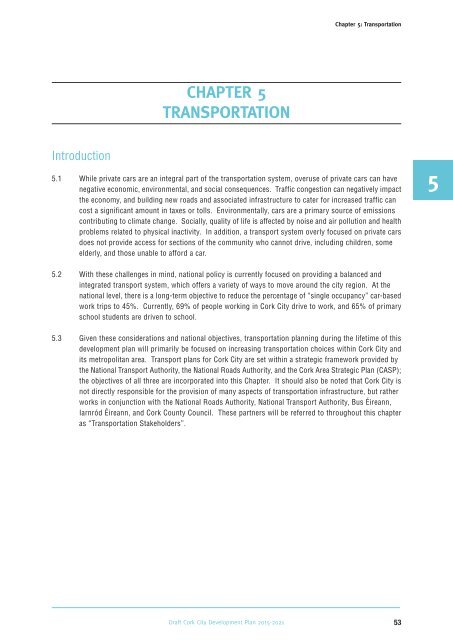Volume 1 Written Statement
Volume 1 Written Statement
Volume 1 Written Statement
You also want an ePaper? Increase the reach of your titles
YUMPU automatically turns print PDFs into web optimized ePapers that Google loves.
Chapter 5: Transportation<br />
x<br />
CHAPTER 5<br />
TRANSPORTATION<br />
Introduction<br />
5.1 While private cars are an integral part of the transportation system, overuse of private cars can have<br />
negative economic, environmental, and social consequences. Traffic congestion can negatively impact<br />
the economy, and building new roads and associated infrastructure to cater for increased traffic can<br />
cost a significant amount in taxes or tolls. Environmentally, cars are a primary source of emissions<br />
contributing to climate change. Socially, quality of life is affected by noise and air pollution and health<br />
problems related to physical inactivity. In addition, a transport system overly focused on private cars<br />
does not provide access for sections of the community who cannot drive, including children, some<br />
elderly, and those unable to afford a car.<br />
5<br />
5.2 With these challenges in mind, national policy is currently focused on providing a balanced and<br />
integrated transport system, which offers a variety of ways to move around the city region. At the<br />
national level, there is a long-term objective to reduce the percentage of “single occupancy” car-based<br />
work trips to 45%. Currently, 69% of people working in Cork City drive to work, and 65% of primary<br />
school students are driven to school.<br />
5.3 Given these considerations and national objectives, transportation planning during the lifetime of this<br />
development plan will primarily be focused on increasing transportation choices within Cork City and<br />
its metropolitan area. Transport plans for Cork City are set within a strategic framework provided by<br />
the National Transport Authority, the National Roads Authority, and the Cork Area Strategic Plan (CASP);<br />
the objectives of all three are incorporated into this Chapter. It should also be noted that Cork City is<br />
not directly responsible for the provision of many aspects of transportation infrastructure, but rather<br />
works in conjunction with the National Roads Authority, National Transport Authority, Bus Éireann,<br />
Iarnród Éireann, and Cork County Council. These partners will be referred to throughout this chapter<br />
as “Transportation Stakeholders”.<br />
Draft Cork City Development Plan 2015-2021<br />
53


